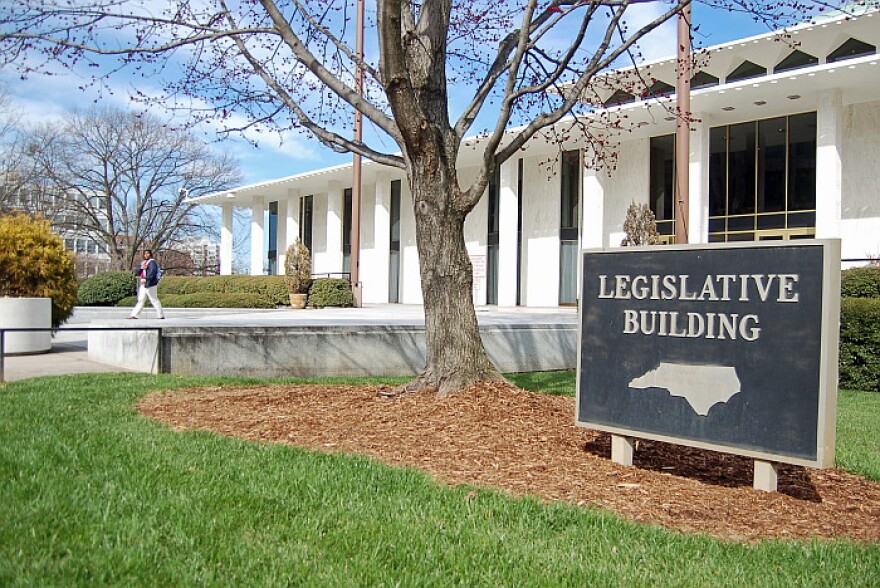The next two-year budget is priority number one for state lawmakers who got back to legislative work at the North Carolina General Assembly on Wednesday. But judging by bills introduced on the first day of filing for the long session, there will be plenty of partisan debate, and even some cooperation, on other, non-budget-related issues.
Medical marijuana may provide the greatest prospect for bridging the partisan divide this session. Last year, a medical marijuana bill drew broad bipartisan support in the state Senate but stalled in the House. Sen. Bill Rabon, a high-ranking Republican and the bill's sponsor, wasted no time in refiling the measure this year.
"I think the public really wants to see this," Rabon said of his bill, which would regulate the use of cannabis for easing the suffering of people struggling with debilitating illnesses or conditions like cancer, epilepsy and Parkinson's disease.
"There's hardly a family in this state or in this nation that hasn't been touched at some point by someone who would benefit from this bill," added Rabon, himself a cancer survivor.
There's 'a chance' a medical marijuana bill could get through the House this year, speaker says
House Speaker Tim Moore (R-Cleveland) gave Rabon some reason for optimism about whether his medical marijuana bill will get a rosier reception in the House this time around.
"I would say there is some support for something where there's doctors involved and where there's some tight controls, and pharmaceutical involvement," Moore said, adding that he has polled his GOP House caucus and is still awaiting responses.
"I'd say there is a chance it may happen," Moore said.

Another thing Moore has polled his House Republican members on is abortion. State law currently bans the procedure after the 20th week of pregnancy.
House, Senate Republicans trying to find consensus on abortion restrictions
Democrats in the state Senate have filed a bill that would codify abortion rights protections established by Roe v. Wade, the 50-year-old case and legal precedent swept away in June by the U.S. Supreme Court's conservative majority. That bill has virtually no chance of moving out of committee in the GOP-dominated legislature.
"I don't want to say where we are on that," Moore said about the poll of House Republicans. "It seems that there is probably a consensus position somewhere between the extremes."
The likely meeting point for House and Senate Republicans is a ban after the first trimester, or around 12 weeks, a cutoff for which Senate President Pro Tem Phil Berger (R-Rockingham) has expressed support.
"I suspect that whatever we come up with will be in line with where the Senate is," Moore said. "I don't think you'll see any daylight between the House and the Senate."
Where one might see daylight between House and Senate Republicans is the issue of expanding Medicaid, which could extend federally subsidized health care insurance to hundreds of thousands of low-income North Carolinians.
Key divisions over expanding Medicaid are between House and Senate Republicans
Last year, lawmakers came as close as ever to agreeing on legislation to expand Medicaid, but House and Senate talks broke down due to disagreements over the state's Certificate of Need law, which requires hospitals to seek regulatory permission to add beds or equipment to their facilities. The Senate wanted curtailing that law to be tied to expanding Medicaid. The House did not.
Senator Berger told reporters Wednesday he has not seen any tangible progress on discussions about Medicaid expansion with his Republican counterparts in the House.
But the session has just begun in earnest and, as Berger said, the primary task at hand is to prepare for work on the budget.
As for Speaker Moore, he says there is substantial support among Republicans in his chamber for expanding Medicaid with what he called "appropriate safeguards," such as "insuring cost to the state, affordability and access to care."
And Moore said timing is of the essence for expanding Medicaid because lawmakers want to link it to the budget which must be before the start of the fiscal year on July 1.
"You don't necessarily have to put it inside the budget," Moore said, "but you'd probably have it tied to the budget in such a way that one only became law if the other became law."
Democrats' ability to uphold governor's vetoes will be tested
Whereas Democrats and Republicans will find common ground on expanding Medicaid coverage, they will never see eye to eye on another GOP bill filed in the House on Wednesday.
The bill would require sheriffs to cooperate with federal immigration authorities on detaining suspects believed to be undocumented immigrants regardless of local court-ordered releases.
Such measures got no support from Democrats in the past and Gov. Roy Cooper, a Democrat, vetoed a similar bill just last year.
Moore assured reporters that if and when Cooper vetoes a bill this session, House Republicans will try to override it.
Senate Republicans, who outnumber Democrats 30-20, have the numbers to override vetoes without help from the other side of the aisle. At 71-49, House Republicans are just one seat shy of an outright veto-proof majority. and would need at least one Democrat to break ranks — or stay home for the day — to override a gubernatorial veto. An override requires a three-fifths majority vote of those present in each chamber.
And Moore has taken to calling the GOP's simple majority in the House a "governing supermajority" because of how confident he is that he will find those Democratic override votes.







